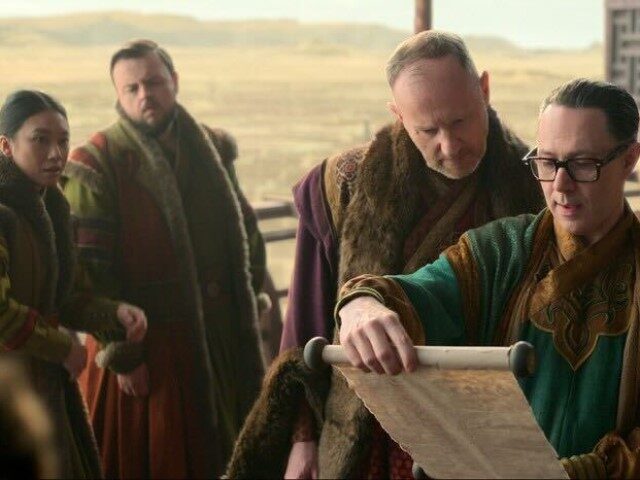'Political Correctness': Chinese Media Complain Netflix Cast Non-Chinese Actors in '3 Body Problem'
 Netflix
Netflix
The Chinese state propaganda newspaper Global Times quoted film critics, online commentators, and others in an article on Tuesday complaining that the Netflix adaptation of the Chinese science fiction novel The Three-Body Problem used “people of different skin colors.”
The Netflix television series 3 Body Problem debuted on the streamer, which the Communist Party has banned in the country, last week. The original novel, by author Liu Cixin, is one of the most acclaimed pieces of Chinese science fiction literature in modern history, telling the story of how disillusion with humanity, partially fueled by the horrors of the communist “Cultural Revolution,” invited a violent alien invasion and the end of indigenous life on earth.
Liu has hinted in prior interviews that ensuring the Communist Party allowed the publication of his novel required changes to the text – including hiding what he intended to be the opening scene of the novel, a Cultural Revolution mob lynching, in the middle of the novel. He told the New York Times, a newspaper sympathetic to Cultural Revolution mastermind Mao Zedong, that he greenlit moving the scene to the opening of the English-language translation and had originally intended it to be there.
Liu reportedly gave the showrunners of the Netflix adaptation his “blessing” to make dramatic changes to his original text, which extended far beyond the changes from Chinese text to English. The most visible change from the book is the inclusion of non-Chinese characters and international settings, including the United Kingdom. The Global Times lamented this change as a concession to “political correctness,” describing it as a common complaint among online commenters in China.
“Some approved of Netflix's deliberate globalization of The Three-Body Problem,” the state outlet claimed, “Meanwhile, others believe that the show's international cast was chosen to 'appease political correctness,' and criticized the adaptation as 'bland and superficial.'”
“I think the discomfort I feel might precisely lie in the cultural differences. For instance, its localization, featuring people of different skin colors, is what netizens refer to as political correctness,” one of the film critics quoted in the article, Shi Wenxue, admitted. Shi said that the Netflix version “failed to accurately present his [Liu Cixin's] values and cosmology.”
Chinese “netizens” – social media users with opinions that the Communist Party does not censor – also complained that Netflix turned the novel into “a Western heroic-style Hollywood story.”
“There are also complaints about the adaptation of character settings, nationalities, and genders,” it added.
The state outlet did not entirely condemn the television series, however, claiming that “internationalizing” the story was not “about deliberately denigrating China on an ideological level,” but rather making it possible for more people around the world to enjoy a Chinese story.
The Global Times did not address how Chinese social media users were accessing the Netflix show, given that it is not legal to subscribe to Netflix in China. According to Hong Kong's South China Morning Post, an enormous volume of online pirating and copious use of VPNs is responsible.
“The number of downloads of BitTorrent files, a type of peer-to-peer file sharing, associated with the show hit 90,618 on March 21 and 72,764 the following day in China,” the Morning Post reported on Monday. “It was far above downloads of other streaming originals that have garnered positive attention in the country in their first week of release, data from iknowwhatyoudownload.com shows.”
Chatter on Weibo, China's largest regime-controlled social media outlet, also indicated that the Chinese government was allowing discussion of the Netflix adaptation even while not allowing subscriptions to Netflix.
“The new series was trending on Chinese social media platform Weibo on March 22 with 21 million views so far, and was first on the platform’s 'top hot' trend rankings despite Netflix being officially inaccessible in China,” Singapore's Straits Times observed this weekend.
Some of the cast of the Netflix adaptation have addressed the changes to the novel, defending the inclusion of non-Chinese characters and people of “different skin colors.”
“I think it’s important to have an international version of the story. Narrow-mindedness drives me a little bit nuts. Am I OK to say that? I love that this has been made more international for a wider audience,” Rosalind Chao, one of the protagonists of the series, said in a recent interview with the Hollywood Reporter. “You’ll probably get me more blacklisted in China for saying this, but I have a cousin who was isolated and lived with pigs for 10 years [in China]. He’s in America now, and I only found this out at Thanksgiving when he didn’t want to eat ham.”
“They don’t talk about [the Revolution]. It’s so ingrained not to discuss it, whereas it’s a huge part of history and the fact that it can be told here in a way that also embraces the sci-fi genre, it’s kind of exciting. It’s important for people to understand world history and what makes people the way they are,” Chao explained.
Co-star Benedict Wong told NBC News that Liu Cixin gave producers his “blessing to move this story into a global story,” a claim Liu himself has corroborated.
“It must face the whole world. Most of its characters may no longer be Chinese. This may not be very suitable for the Chinese audience, but I still have full confidence in [Netflix] and am looking forward to it,” Liu said in remarks recently posted on the Chinese site Bilibili.
Follow Frances Martel on Facebook and Twitter.
Source link

